- Home
- Frank Herbert
Frank Herbert Page 2
Frank Herbert Read online
Page 2
“Is that bad, sir?”
“Well, not too bad. But of course we’d have to discharge you from the service. You understand that such a condition would endanger your shipmates. You might pass out sometime when it was important.”
Davis looked up the ward at Blackie. The corpsman was still watching him. “Why not?” he asked himself. “Why not? It’d get me away from these bastards.”
“I had a cousin once with epilepsy,” he said.
The doctor pounced. “I thought so. Did you ever have these fainting spells before?”
“Off and on, sir.”
“Uh-huh. Just as I thought. You know, of course, that you should have told your recruiting officer about this.”
Davis nodded.
“Well, I’ll have you sent to an out ward tomorrow morning. You’ll have to wait several weeks to come up before the board, and then you can go home.”
The first thing Davis noticed about the out ward was that it had no bars on the windows. Maybe the lie was worth it, he thought. It was good to get out of the bathrobe and into his uniform again, too. The corpsman in the office at the end of the ward smiled at him. “Take lower eight,” he said. “You’re in the port watch—cleaning detail every other day. You start tomorrow. The bulletin board is right around that corner. Your name will be posted the day before your survey date.”
Davis went down the ward, found bunk eight, and hung his sea bag from the headpost. He sat down on the bunk and tried the springs. Then he thought of the “No sitting on beds” order in Seventeen. He looked around. Men were sitting on their bunks all up and down the ward. He felt like crying.
The following morning when he returned from the chow hall, Davis found the bulletin board and examined the mimeographed sheet with the names of the men who would come up before the survey board the next day. The names were in purple ink in long, even rows. For ten days he studied the sheet every morning. On the tenth day, a Friday, he found his name fourth from the top in the middle row: “Davis, Charles, S1c.” He went back to his bunk and began putting his sea bag in order.
There was no elation in Davis when he awoke the next morning. He was nervous. What if there’d been a slip? What if they’d written his folks and gotten some wrong answers? He walked over to the main building a half hour early and joined the group waiting on a bench outside the board room. The others appeared nervous, too. “This is it,” someone said. There was a ripple of tight laughter.
Davis hoped he wouldn’t see Blackie. This was in the same wing as Seventeen, but maybe he’d be lucky. Then his name was called, and he stepped through the mahogany door. Blackie sat at a desk just inside the door. Five doctors were in a circle around a table in the center of the room. Doctor Knauffer was in the middle on the far side of the table.
Stepping forward, Davis stood at attention.
“Have you any objection to being discharged?” Doctor Knauffer asked.
“No, sir.” He hoped his voice wouldn’t crack.
“Then please sign the papers the corpsman has over there,” the doctor said.
Davis remained standing before the table. There should be more to it than this.
“That’s all.” The doctor gestured with the back of his hand.
Davis turned and stepped over to the table.
Blackie held out a pen and pointed to a line on a paper. Davis signed. Blackie pointed to another line. Again Davis signed. He looked up and his eyes met Blackie’s. The corpsman smiled and pointed down to the paper. Davis followed the finger to a single word: “Epilepsy.”
O O O
Waiting in the station for the train to take him home, Davis knotted and unknotted the rope on his sea bag. “Well, I’m outta that,” he told himself. “I oughta feel great. That’s the way I oughta feel.”
The dispatcher’s loudspeaker came to life: “Chicago passengers! Chicago passengers! Through gate five!”
Davis arose, picked up his sea bag, and joined the crowd jostling and pushing one another across the depot and through the tall, barred gates.
The Illegitimate Stage
From the outside, it was a peaceful scene—six green-and-white houseboats moored along the east bank of the Wallan River in the shadow of a steel bridge. The houseboats nestled against a weathered gray boardwalk. Between the boardwalk and the riverbank grew cattails and marsh grasses.
The jade-colored curtains on the first houseboat’s riverside windows snapped back. The dark face of a young man appeared at the window, scowling out at the morning sunlight. Without turning his head, he spoke to the slim blonde woman seated at the kitchen table behind him.
“It was your crazy idea in the first place!”
The woman turned her narrow, sensitive features toward the man’s back, drawing her brows down.
“Roger Corot, you stop acting like that! I’m not a child. I just said it for a joke, and you took it up and made everybody believe it.”
The man half turned from the window, raised his palms up, and looked toward the ceiling.
“That’s right,” he said. “It’s all my fault. When I’m fired and we’re reduced to begging on the street, you can tell your friends, ‘Roger did this to me!’”
“Now you’re going to be dramatic,” she said. “You know you’re the one who wants to keep up this Bohemian atmosphere.” She gestured around her at the houseboat, an array of bamboo furniture in pastel greens and oranges, a grass mat rug.
Roger hurled himself into a chair opposite the woman, buried his head in his hands. He raised his head, looked across the table. His dark eyes were opened wide; his black hair was disarrayed, curled slightly at the forehead; his voice was deep.
“Pepina!” he said. “Don’t destroy me! You know I can’t create in a flat. I have to have the soothing atmosphere of life—like the great current of a river around me. Don’t do this to me.”
“Very poetic,” she said. “Now, what about—”
He raised a restraining hand. “Please. If you’d only explain to me why you told everyone we’re not married … Well, perhaps I could understand. If you could only explain it to me.”
The woman brought her hands from her lap—long, thin hands on thin wrists. She put her hands over her face, lowered them. In the depths of her green eyes there was a bemused twinkle.
“Roger, for the nine thousand, nine hundred and ninety-ninth time, I was just making a joke. If I had suspected for a moment that you would take me up and make it a great dramatic production—we artists together—I’d have kept my big trap shut, as my father used to say.”
She stood up, an emerald housecoat falling gently into place around her. “Now be a good boy and get off to the college. You’ll have a whole class full of French students wondering where their instructor is.”
Roger stood up, took an English tweed topcoat from the back of an adjacent chair, and draped it over his left arm.
“Yes. And as soon as this story gets back to President Coleman, they’ll know where I am—fired!” He leaned across the table. “Why didn’t you think of that? You knew the president of the college was the chairman of the Wallan County Anti-Vice League.”
Her voice was flat as she replied: “So did you, Roger; so did you.”
He shook his head. “Why? Why? Why?”
“Roger!” Pepina stamped her foot. “I’ve got a why for you. You’ve had two whole years to scotch this story. But no! You have to keep adding to it. You have to brag about it! You haven’t explained that to my satisfaction.”
Roger slumped back into the chair he had vacated, draped the coat over his knees. “I’ve told you. It’s this play.”
“Oh, Roger. You know that doesn’t make sense.”
“Yes, it does. You don’t understand this authoress. I will explain it in words of one syllable. This is Mrs. Abelarde Gruntey. She is the widow of Amos Gruntey, who endowed Gruntey Hall. She has written this play. She calls it Rhythm of Life. That should tell you enough about it.”
Pepina sighed and sat down in
her chair. She took an electric coffee pot from the corner of the table, poured herself a fresh cup.
“I’ve read the play. I know. But I don’t understand what all this has to do with your sudden attack of respectability.”
“Pepina,” he said, drawing out the syllables, “President Coleman wants a new gymnasium from this woman. He ordered me to produce her play. I have to do it. And when we get into production, this female behemoth will be at mine elbow.”
He raised his voice. “And sure as fate, one of those dunderhead dramatics students of mine will let it slip to her that we’re a pair of sinners, and she’ll take it straight to Coleman. I tell you, the jig is up!”
Pepina shrugged her shoulders. “So take him our marriage license and make a fool out of her.”
Roger’s voice became low and charged with feeling. “But Pepina! I’d never be able to face them again. Never! The … the shine would be all gone off our relationship. This way it’s dramatic. It inspires them. When I tell them how to act, they leap to obey. They know I’m right. I have the … the Continental touch.”
“Yes,” Pepina said, “and a couple of these starry-eyed students will try to follow our supposed example one of these days, and then the fat will really be in the fire.”
“Everywhere I turn I see a blank wall,” Roger said. “It’s fate creeping up on me. I feel like one of those psychological cats in a puzzle box. There’s no door out.”
“We’ll talk about it tonight,” Pepina said. She looked up at the Bavarian cuckoo clock above Roger’s head. “You’re already five minutes late. I love you. All is lost. Scram!”
Roger leaped to his feet. “You have no soul. I love you anyway. Here, kiss me.”
He bent down, kissed her lips. As he pulled away, Pepina patted his cheek. “Life is but a series of excursions and alarms,” she said. “Now hurry.”
Roger stood up, shrugged. “C’est la vie!” He turned, hurried from the houseboat.
Pepina walked after him, stopped at the door, watching. A soft look filled her eyes.
Roger strode briskly up the boardwalk, shrugging into his topcoat.
Under her breath, Pepina said, “You ham!”
From the reeds at the riverbank there came the rumbling basso of a bullfrog.
“Mr. Amonto,” Pepina said. “I haven’t fed you this morning.”
She went into the houseboat, returned in a moment with a handful of bacon scraps. She tossed a piece of bacon toward the muddy bank. There was a splash. A wide green shape with two up-bulging eyes swam majestically out, engulfed the bacon. The frog floated upward until only the eyes protruded from the water. Pepina tossed the rest of the bacon in front of the frog. Mr. Amonto gave a brief kick with his hind legs, caught the first piece, moved on to another.
Pepina returned to the houseboat.
O O O
At east Comity College, President Clinton Coleman was having an early morning conference with Mrs. Gruntey. He sat at his wide mahogany desk in a leather-upholstered swivel chair, now and then turning it from side to side.
On the wall behind the president, a linen sampler hung in a dark oak frame: a little red-and-green house with smoke curling from a chimney. Doves and ivy crowded each other in the top corners. Worked in blue cross-stitch across the center was a motto: “If one ferrets out sin wherever it appears, this will be a better world in which to live.”
The remarkable thing about the motto was that President Coleman did resemble a ferret. He had beady eyes set close above a long, hooked nose. A thin mouth poised over a long, outjutting chin, ready to pour out vitriol.
Mrs. Gruntey, a contrast in fat, sat clothed in satins and silks, a sable stole over her shoulders. She looked the German housefrau suddenly come into money. Her face was oval. The eyes had avoided the pinch of fat cheeks and now stared out with a round blue clarity at the world. Mrs. Gruntey was telling President Coleman how she had come to write Rhythm of Life.
President Coleman, his mind adding up the cost of gymnasium flooring, bleachers, and equipment, nodded from time to time as words buzzed somnolently around him.
“I was in Portland,” Mrs. Gruntey said, her voice taking on a dreamy, distant note. “A woman friend just insisted I go with her to see the road show performance of an Italian movie. I didn’t want to go. When I think how close I came to not going, I just shudder. I had Lincoln drive me right home afterward. I was so excited I couldn’t sleep. Finally, I got up and took out Amos’s old typewriter and began my play.”
Her voice took on a flat, explanatory tone. “It’s an Oliver, you know,” she said. “The typewriter. Very old.”
The dreamy note crept back into her voice. “I had the title in my mind before I wrote the first word. The Rhythm of Life.” Her voice lilted over the words; she repeated them. “The Rhythm of Life. It has …” She looked down at her fleshy hands clasped in her lap, brought her hands to her mounded bosom. “It has such vibrations.”
President Coleman nodded. “Indeed it has. I never dreamed you were so talented.” He kept his eyes raised to the level of Mrs. Gruntey’s dyed hair. (“Just a little chestnut tint to bring out the highlights.”)
“Your Mr. Corot is so talented,” Mrs. Gruntey said. “He knows exactly how it should be staged. I’m certain it’s going to be the hit of the Fall Fiesta. The vibrations of my play so fit the mood of the Fiesta.”
President Coleman pursed his lips. “It is a proper play, of course.”
“It’s life,” Mrs. Gruntey said. “It has reality; it vibrates with living. You know that place in the third set where …”
President Coleman coughed. “Well, I’ve not read that far yet. The responsibilities of my position … seeing the architects … You know how it is.”
“You really are such a busy man, Mr. Coleman. It’s unkind of me to take up so much of your time. I must be running along.”
She stood up.
President Coleman arose with her. “Oh, my dear Mrs. Gruntey. Every minute with you is a pleasure. Really. We must get together for tea sometime this week. I want to talk about the new gymnasium.”
“I’ll check my calendar and call you,” Mrs. Gruntey said. “Au revoir!” She raised one fleshy hand. The jeweled fingers flashed and twinkled. The reflected beam from a large diamond flickered into President Coleman’s eyes and seemed to lodge there.
Mrs. Gruntey went out the door.
President Coleman sank back into his chair, opened the bottom right-hand drawer of his desk. He extracted Mrs. Gruntey’s manuscript from where he had placed it, unopened, the day she had presented it to him. He put the manuscript neatly in the center of the green desk blotter, opened to the first page, made a crease down the fold where he had opened it. He began to read:
“Melissa Corday is a beautiful girl of twenty-two whose mother came over from the old country and has raised her daughter by doing housework for the rich. Melissa is actually the illegitimate daughter of a famous count, but her mother has kept this fact hidden from her daughter for fear it would taint the young mind. For a year before our play opens …”
“Mustn’t taint young minds,” he thought.
President Coleman’s telephone rang. He put down the play, picked up the telephone. It was the architect for the new gymnasium. The architect wanted to see President Coleman at the gymnasium. President Coleman said he would be there. He stood up, took the manuscript, and carried it out to his secretary.
“Miss James,” he said to the spinsterish woman in the outer office. “Read this through and write me a two-page report giving the highlights of it.” He put the manuscript on the corner of her desk.
“Yes, Mr. Coleman.”
Mr. Coleman turned, marched out of his office, going over in his mind sample ways of presenting to Mrs. Gruntey the fact that there was a twenty-eight thousand dollar deficiency in the gymnasium building fund.
O O O
For Roger, the day passed in a frenzy of French, a dollop of drama, and a stale slab of meat loaf he ate in th
e Commons for lunch. The meat loaf sat undigested in his stomach all afternoon.
“Mother would have known what to do,” he thought. “Pepina is being unreasonable.”
Roger’s mother had been the wife of a diplomatic attaché. She had guided her son’s life toward a career in the ballet. When he was two years old, she had enrolled him with special instructors in Paris. She had nurtured his tantrums, clothed his ego, guarded him from the world and, when he was fifteen, had died. This act of maternal desertion had thrown Roger into his first real contact with a father who was a stranger. The father had solved the problem with a Swiss boarding school. The headmaster’s daughter, Pepina, a girl two years Roger’s junior, turned out to have such a close physical resemblance to Roger’s mother that Roger had substituted love for his grief and resentment.
A result of Roger’s ballet training was that he was a graceful man. He walked with the balance of a panther.
As he joined the evening crowds on East Comity’s Center Street in his walk toward the houseboat, Roger added an unconscious dance rhythm to the flow of pedestrian traffic. He deposited a coin in a newsboy’s hand, accepted a paper without pausing more than a half beat, danced aside to avoid a hurrying woman whose arms were loaded with packages. In the same rhythm, he stepped off the curb, crossed toward Lyttle Street. On the opposite walk, he opened his copy of Mrs. Gruntey’s manuscript to the second act, began to read as he walked:
“Melissa takes the baby home to …”
With a thump which sent the manuscript fluttering to the street, Roger collided with a short man who was reading a newspaper.
“So sorry,” Roger muttered. “Wasn’t looking.” He stooped, collected the manuscript.
“Hrrrrmph,” the short man said, and walked around Roger.
Roger folded the manuscript under his arm, stood up.
“Boors,” he muttered, and strode toward the houseboat.
Pepina, wearing a red peasant skirt and halter and tan ballet slippers, was improvising a ballet to the music of “Death and Transfiguration” when Roger burst into the living room. A tall girl, she reflected the Swiss-Italian beauty of her mother and the blondness of her American father. Her eyes were large, nose slightly overlong, lips full, chin gently rounded.

 Direct Descent
Direct Descent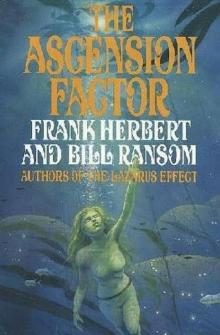 The Ascension Factor
The Ascension Factor The Heaven Makers
The Heaven Makers Children of Dune
Children of Dune Old Rambling House
Old Rambling House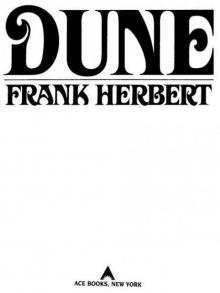 Dune
Dune The Worlds of Frank Herbert
The Worlds of Frank Herbert The Jesus Incident
The Jesus Incident Heretics of Dune
Heretics of Dune Whipping Star
Whipping Star Dune Messiah
Dune Messiah Man of Two Worlds
Man of Two Worlds The Book of Frank Herbert
The Book of Frank Herbert Hunters Of Dune
Hunters Of Dune The Tactful Saboteur
The Tactful Saboteur Soul Catcher
Soul Catcher God Emperor of Dune
God Emperor of Dune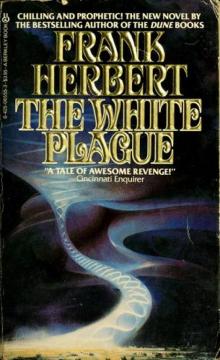 The White Plague
The White Plague The Green Brain
The Green Brain The Godmakers
The Godmakers Sandworms of Dune
Sandworms of Dune Destination Void
Destination Void The Dosadi Experiment
The Dosadi Experiment Eye
Eye High-Opp
High-Opp The Eyes of Heisenberg
The Eyes of Heisenberg Missing Link
Missing Link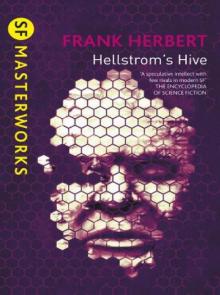 Hellstrom's Hive
Hellstrom's Hive Chapterhouse: Dune
Chapterhouse: Dune The Santaroga Barrier
The Santaroga Barrier The Dragon in the Sea
The Dragon in the Sea Operation Haystack
Operation Haystack A Thorn in the Bush
A Thorn in the Bush Four Unpublished Novels
Four Unpublished Novels Dune dc-1
Dune dc-1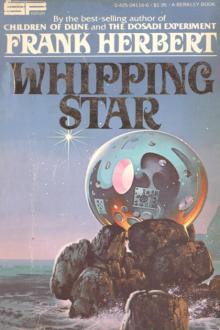 Jorj X. McKie 1 - Whipping Star
Jorj X. McKie 1 - Whipping Star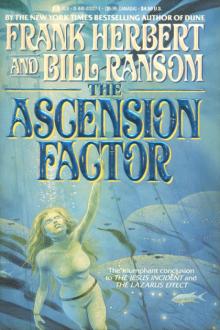 DV 4 - The Ascension Factor
DV 4 - The Ascension Factor Frank Herbert - Dune Book 4 - God Emperor Of Dune
Frank Herbert - Dune Book 4 - God Emperor Of Dune ChapterHouse: Dune dc-6
ChapterHouse: Dune dc-6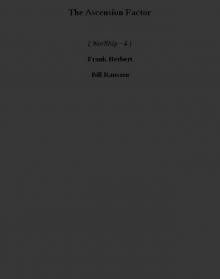 The Ascension Factor w-4
The Ascension Factor w-4 A Game of Authors
A Game of Authors Children of Dune dc-3
Children of Dune dc-3 Destination: Void: Prequel to the Pandora Sequence
Destination: Void: Prequel to the Pandora Sequence The Collected Stories of Frank Herbert
The Collected Stories of Frank Herbert Dune Messiah dc-2
Dune Messiah dc-2 Frank Herbert - Dune Book 5 - Heretics of Dune
Frank Herbert - Dune Book 5 - Heretics of Dune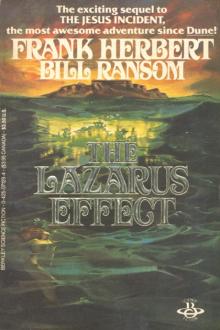 DV 3 - The Lazarus Effect
DV 3 - The Lazarus Effect The Jesus Incident w-2
The Jesus Incident w-2 The Lazarus Effect w-3
The Lazarus Effect w-3 Frank Herbert
Frank Herbert The Ascension Factor: Pandora Sequence
The Ascension Factor: Pandora Sequence Dune (40th Anniversary Edition)
Dune (40th Anniversary Edition) The Dosadi Experiment c-2
The Dosadi Experiment c-2 The Lazarus Effect
The Lazarus Effect God Emperor of Dune dc-4
God Emperor of Dune dc-4 The Pandora Sequence: The Jesus Incident, the Lazarus Effect, the Ascension Factor
The Pandora Sequence: The Jesus Incident, the Lazarus Effect, the Ascension Factor The Green Brain (v4.0)
The Green Brain (v4.0) The Heaven Makers (v4.0)
The Heaven Makers (v4.0) Heretics of Dune dc-5
Heretics of Dune dc-5